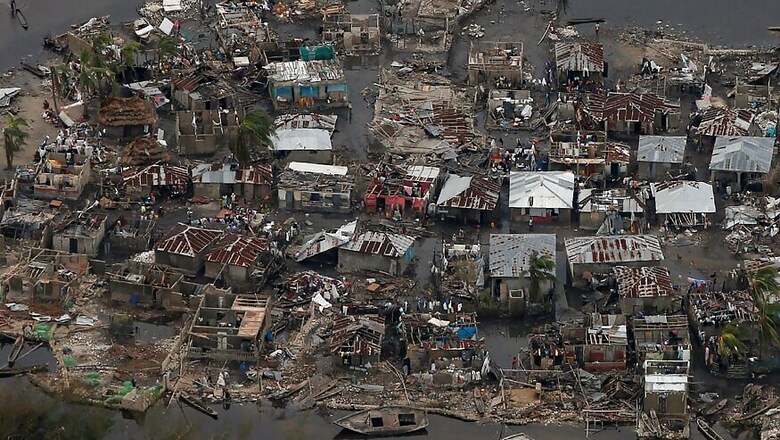
views
Chantal: Hurricane Matthew's trail of destruction in Haiti stunned those viewing the aftermath on Friday, with the number of dead soaring to 842, tens of thousands made homeless and crops destroyed in the impoverished Caribbean nation's breadbasket region.
Information trickled in from remote areas that were cut off by the storm, and it became clear that at least 175 people died in villages clustered among the hills and coast of Haiti's fertile western tip.
At least three towns reported dozens of fatalities, including the hilly farming village of Chantal, whose mayor said 86 people perished, mostly when trees crushed houses. He said 20 more people were missing.
"A tree fell on the house and flattened it, the entire house fell on us. I couldn’t get out," said driver Jean-Pierre Jean-Donald, 27, who had been married for a year.
"People came to lift the rubble, and then we saw my wife who had died in the same spot," Jean-Donald said, his young daughter by his side, crying "Mommy."
Dozens more were missing, many of them in the Grand'Anse region on the northern side of the peninsula.
Coastal town Les Anglais also lost "several dozen" people, the central government representative in the region, Louis-Paul Raphael, told Reuters.
With fatalities mounting, various government agencies and committees differed on total deaths. A Reuters count of deaths reported by civil protection and local officials put the toll at 842.
Haiti's central civil protection agency, which takes longer to collate numbers because it needs to visually confirm victims itself, said 271 people died as Matthew smashed through the western peninsula on Tuesday with 145 mile-per-hour (233 kph) winds and torrential rain.
Some 61,500 people were in shelters, the agency said.
FLEEING FOR LIFE
Les Anglais was the first place in Haiti that Matthew reached, as a powerful Category 4 storm before it moved north, lost strength and lashed central Florida on Friday.
Hours before the hurricane landed in Haiti, the Les Anglais mayor told Reuters residents were fleeing for their lives as the ocean rushed into their homes.
With cellphone networks down and roads flooded by sea and river water, aid has been slow to reach towns and villages around the peninsula. Instead, locals have been helping each other.
"My house wasn't destroyed, so I am receiving people, like it's a temporary shelter," said Bellony Amazan in the town of Cavaillon, where around a dozen people died. Amazan said she had no food to give people.
Outside Chantal, stall holders at a makeshift market were selling vegetables and soft drinks, brought it from Port-Au-Prince as roads were cleared to the capital.

















Comments
0 comment